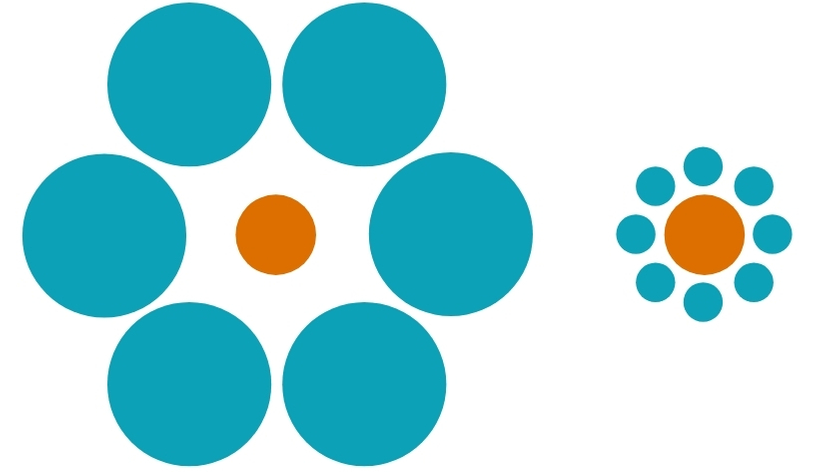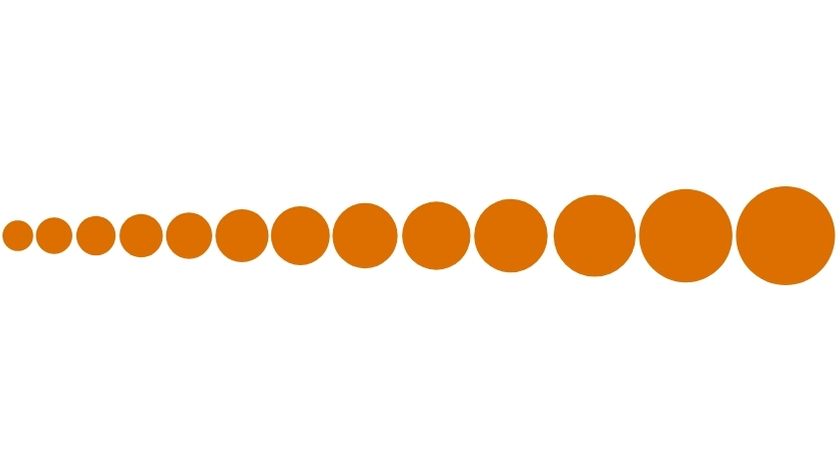In Dr. Mel Goodale’s lab where I did my undergraduate thesis research, a big focus of the work involved studying optical illusions to better understand how our brains create and navigate the gap between perception and reality.
Looking at these optical illusions again in recent years, I see them a bit differently. I now look at them and notice new ways our brains might trick us and make it more challenging to building trust in yourself.
When Perception Differs from Reality
Take a look at this image and consider which centre orange circle seems bigger:

This is an example of an Ebbinghaus illusion, an illusion of relative size perception.
In reality, both of the centre orange circles are the same size. Go ahead and measure to check if you like.
The perceptual trickery results from the juxtaposition of circles: the orange circle on the left surrounded by larger circles appears smaller than the orange circle on the right surrounded by smaller circles.
Comparison of the image on the left and right is fooling our brains.
Comparisons are Tricky
Visual illusions aren’t the only thing that trips our brains up and gives rise to mismatches between our perception and reality.
We also frequently deceive our brains when we compare ourselves to others, quite often comparing to the best in class or to someone’s highlight reel they’ve curated on Instagram, TikTok, LinkedIn, or elsewhere.
This is like the two images in the Ebbinghaus Illusion. Your comparison to another person might be giving rise to an illusion that fools your brain and can hold you back. Your contexts – the juxtapositions of the circles – are surely different, which may cause you to perceive things to be more different than they truly are.
This illusion of relative perception can be powerful fuel for the negative self talk that all of us have and few of us talk about. It can amplify the inner voice that says things like “Who do you think you are to try? You’re not good enough.” and “You’re going to fail, so why bother?” This voice is also known as Impostor Syndrome, the inner critic, or the “itty bitty shitty committee” (a name shared with us by a participant in the In Trust virtual workshop). It reflects a lack of trust in ourselves which is often the biggest obstacle we face when we’re seeking to stretch, strive, and grow.
So how do you overcome this comparison illusion that is misleading your brain so you do the work of building trust in yourself?
Building Trust in Yourself with a More Trusted Comparison
The trick to overcome the illusion is not to not compare. Comparing is something we all do and can be helpful in our learning journey. A key is in what you are comparing yourself to.
Instead of comparing yourself to others and giving rise to the illusion, you can help your brain help you by comparing yourself to where you were yesterday. In what you’re seeking to learn or achieve, strive to consistently get just a little bit better than the day before and reflect on your progress. Drip, drip, drip, and eventually the bucket gets filled.

This sort of self-comparison can better align your perception with reality. It can help wrangle your inner critic so you can propel yourself forward with greater self-awareness. It can help you notice your progress, trust your process, and better trust in yourself.
“Without self-trust, we can never become wise because we will continue to look outside ourselves for the answer.”
– M. J. Ryan
Want to learn and develop more practical Trust-Centered™ skills so you can better cultivate trust in yourself, trust with others, and trust at scale? Then join us for a FREE, interactive virtual workshop. We’ve just posted new times. Register here.

